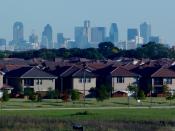My generation has rarely had a positive view of suburban life. I used to attribute this to the fact that my peers had all grown up within city limits, and not just A city, but 'The City of New York'. It was my assumption that we looked down at suburbs because we had never lived there. Now, here in Chicago, nearly everyone I meet in their 20's lives in or at least used to live in a suburb. This is quite reflective of the massive city exodus that took place between the middle to the end of the 20th century.
Like all cultural phenomena, it can never be as simple as to say: THIS IS THE REASON PEOPLE DID IT. There are of course varying factors and multiple reasons as to why people chose to leave the cities; and while I do want to discuss that in this essay, I also want to take some time to analyze the problems and the implications of the national shift from an urban nation to one of the suburbs.
When the Second World War ended, soldiers returned home to an economy revived. Many of their wives had been at work, there were more job opportunities than when they left, and the depression had finally lifted from the nation. This sudden abundance (and the subsequent baby boom) led to the need of more housing for the ever-growing middle-class, and their ever-growing families. Rent in the city was again on the rise, and lack of space and the desire to own property began prompting the post-war G.I. to move his family outward.
Meanwhile the African American population, whose migration towards the cities increased after the First World War, continued to populate the central cities in search of work. The aggregation market, in which...



opinion
really nice to read, having good information
0 out of 0 people found this comment useful.